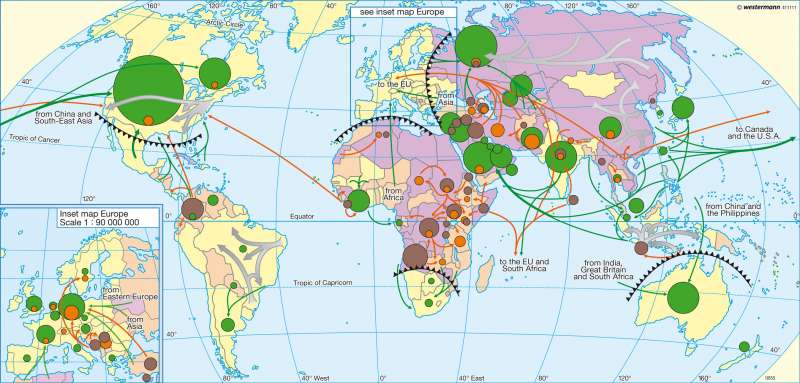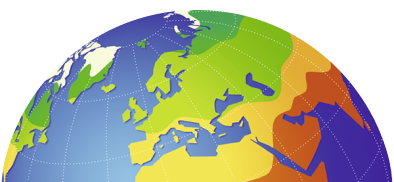Migration — Labour migrants and refugees
The world - Globalization
978-3-14-100790-9 | Page 195 | Ill. 3

Information
The term "migrant" is used to describe people who leave their country — willingly or unwillingly — for more than a year. The reasons could be wars, persecution and hunger, but also the hope of a better life. According to the International Organization for Migration (IOM) there were 191 million migrants worldwide in 2005, compared to 176 million in the year 2000. Thus, migrants account for more than 3 percent of the world population. Some 30 to 40 million migrants are counted as illegal. In addition there are also internal refugees, who do not leave their country but flee from oppression, civil war, hunger, environmental destruction or economic crises within its own borders. According to the IOM there were some 24.5 million people in this category in 2006.According to the United Nations High Commissioner for Refugees (UNHCR), in January 2007 a total of 32,861,500 asylum-seekers or refugees were in the care of UNHCR. Some 14.9 million of these lived in Asia, 9.8 million in Africa, 3.5 million in North America, 3.4 million in Europe, 1.1 million in Latin America and the Caribbean, and some 86,000 in Oceania.
Receiving Countries for Asylum-Seekers
In recent years, South Africa has developed into one of the most important receiving countries: from 2002 to 2006 that country alone received 205,000 applications for asylum. According to UNHCR the following were the most important receiving countries in 2006 in terms of asylum applications: South Africa (53,400), USA (50,800), Kenya (37,300), France (30,800), Great Britain (27,800), Sweden (24,300) and Canada (22,900).
The total number of applications for asylum in the rich industrialized countries is in sharp decline. In Germany only 21,029 new asylum applications were submitted in 2006, the lowest number since 1977. Less than 200,000 asylum applications were registered in the entire EU in 2006, a reduction of 50 percent within the last five years. According to UNHCR the vast majority of refugees stay in developing countries, including among others the refugees from Afghanistan (2.9 million), Colombia (2.5 million), Iraq (1.8 million), Sudan (1.6 million) and Somalia (839,000).
Reasons for Flight
The causes of migration are on the one hand the various situations in which people are subject to persecution — ranging from political, religious or ethnic reasons through to existential threat of oppression of women. Further reasons for flight are war and civil war situations as well as hunger. A further reason, which is growing in importance, is environmental destruction, which can make survival in the affected region increasingly difficult.
For many refugees from West Africa on the other hand, the European fishing policy plays a central role. The European fishing fleets have been oversized for many years, and for just as long the entire North Atlantic, together with its side arms, has been chronically overfished. For a long time, one of the few areas of water with comparatively stable stocks was the coast of Mauretania, until the EU secured fishing rights by means of an agreement in 2001. Since then the local stocks have been exploited by ultra-modern industrial fishing vessels. As each of these ships only holds a licence for particular species, the nets of the vast trawlers catch unimaginable quantities of sea creatures that are meaninglessly destroyed as "by-catch", while a few kilometres away the local fishermen in their wooden sloops catch fewer and fewer fish; in the meantime it is not even sufficient to provide for their own families. The young people are determined to emigrate, and since there is no possibility for them to do so legally they set out in large numbers to cover the distance of some 1,000 kilometres to the Canary Islands in small coastal vessels.
People such as these, who risk their lives to escape from a situation of a complete loss of financial and economic perspectives, are often referred to in the industrialized nations with the disparaging term of "economic refugees". At the border fence to Melilla (in the year 2005) the refugee Bashige Michel described this motive from his own perspective as follows: "This wall of separation, this fence symbolizes a situation in which the South's commodities as well as the North's products, weapons among others, can move but people cannot. ... Is it really impossible to create a different world in which everyone can live in peace? Please understand that we are the victims of a continuing impoverishment that is being organized by the West and often executed by our own leaders in the service of multinational companies."
J. Welkmann; Ü: J. Attfield




